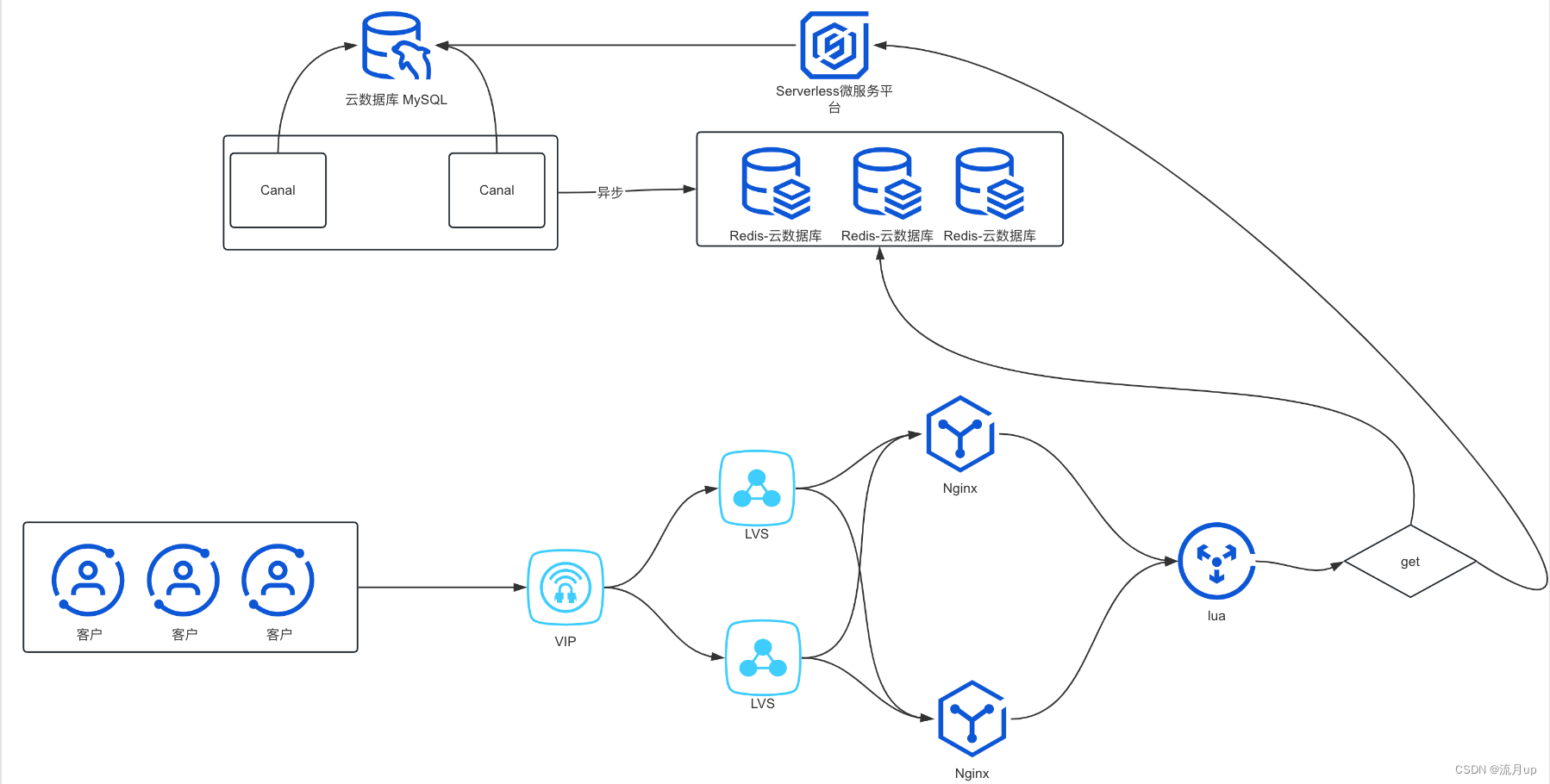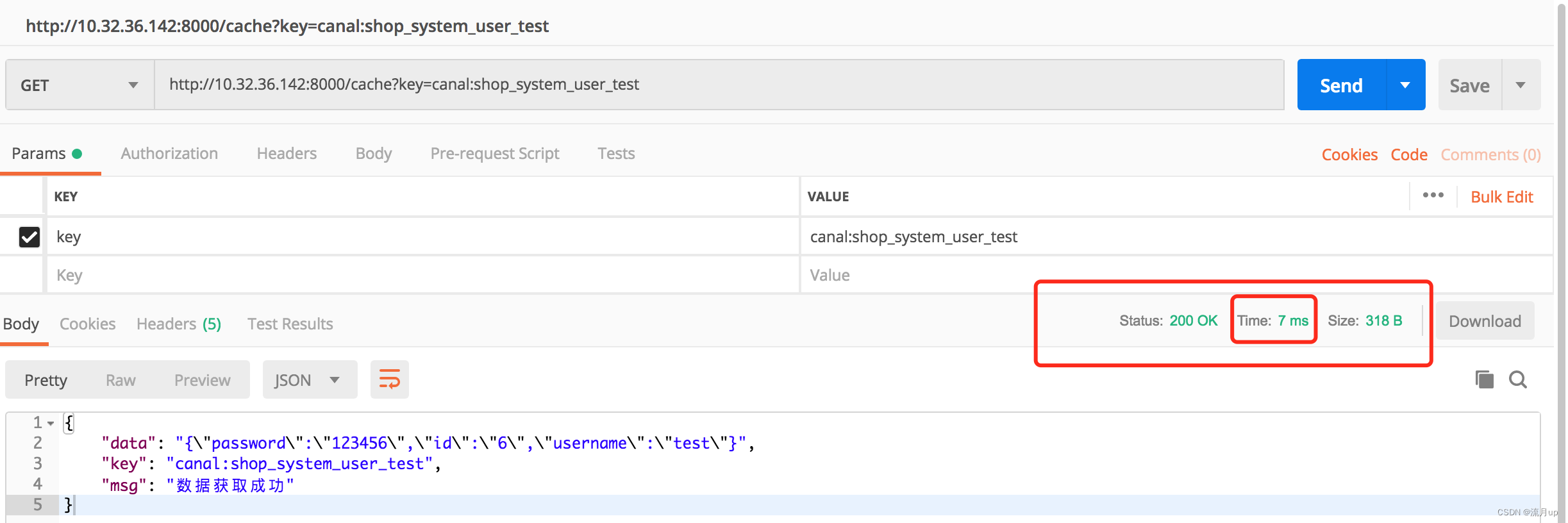目录
概述
本文是对项目中 QPS 高并发相关问题的一种解决方案,利用 Nginx 与 Redis 的高并发、超低延迟响应,结合 Canal 进行实现。
当程序需要提供较高的并发访问时,往往需要在程序中引入缓存技术,通常都是使用Redis 作为缓存,如若再更进一步提升性能,不仅要使用 redis 还要提高 并发,使用能支持超高并发的组件,并将请求响应大部分落在这些组件中。
原本访问缓存逻辑
User---> Nginx -> Tomcat -> Redis
User---> Nginx -> Redis
相关组件可自由下载
懒人直通: openresty/openresty:1.25.3.1-4-alpine-fat redis-7.0.15 docker离线镜像安装包
缓存架构设计
基本数据库 mysql ,整合 canal , 异步的同步数据至 redis 中,主要是利用 redis 与 nginx 的低延迟与高并发。

- HTML页面做缓存,浏览器端可以缓存HTML页面和其他静态资源,防止用户频繁刷新对后端造成巨大压力
- Lvs实现记录不同协议以及不同用户请求链路缓存
- Nginx这里会做HTML页面缓存配置以及Nginx自身缓存配置(本次没有做Nginx缓存)
- 数据查找这里用Lua取代了其他语言查找,提高了处理的性能效率,并发处理能力将大大提升
- 集成Canal实现数据库数据增量实时同步Redis
实践
代码
路由
nginx 路由配置
bash
server {
listen 8000;
set $target_server '';
location /test{
access_by_lua_file /usr/local/openresty/nginx/lua/router.lua;
proxy_pass $target_server;
}
location /cache{
default_type text/html;
content_by_lua_file /usr/local/openresty/nginx/lua/cache_redis.lua;
}
}业务
创建文件 cache_redis.lua
lua
local redis = require "redis_iresty"
local cjson = require("cjson")
local ngx_ERR = ngx.ERR
local ngx_exit = ngx.exit
local ngx_print = ngx.print
-- local ngx_re_match = ngx.re.match
local ngx_var = ngx.var
-- 响应输出内容
-- body http输出body内容
-- status http状态码
-- header http响应头,table格式
local function response(body,status,header)
ngx.status = status
if header then
for key, val in pairs(header) do
ngx.header[key] = val
end
end
--ngx_print(body)
ngx.say(cjson.encode(body))
ngx_exit(ngx.status)
end
local opts = {
ip = "10.32.36.142",
port = "6379",
password = "123456",
db_index = 0
}
local red = redis:new(opts)
local status = 200
local header = {}
local content = {}
-- 返回的是一个table类型
local args = ngx.req.get_uri_args()
-- 获取名为"key"的参数
local key = args["key"]
header['content_type'] = 'application/json; charset=utf-8'
local value = red:get(key)
content['data'] = value
content['msg'] = '数据获取成功'
content['key'] = key
response(content,status,header)封装redis
网上寻找的 redis 二次封装 redis_iresty.lua
lua
local redis_c = require "resty.redis"
local ok, new_tab = pcall(require, "table.new")
if not ok or type(new_tab) ~= "function" then
new_tab = function (narr, nrec) return {} end
end
local _M = new_tab(0, 155)
_M._VERSION = '0.01'
local commands = {
"append", "auth", "bgrewriteaof",
"bgsave", "bitcount", "bitop",
"blpop", "brpop",
"brpoplpush", "client", "config",
"dbsize",
"debug", "decr", "decrby",
"del", "discard", "dump",
"echo",
"eval", "exec", "exists",
"expire", "expireat", "flushall",
"flushdb", "get", "getbit",
"getrange", "getset", "hdel",
"hexists", "hget", "hgetall",
"hincrby", "hincrbyfloat", "hkeys",
"hlen",
"hmget", "hmset", "hscan",
"hset",
"hsetnx", "hvals", "incr",
"incrby", "incrbyfloat", "info",
"keys",
"lastsave", "lindex", "linsert",
"llen", "lpop", "lpush",
"lpushx", "lrange", "lrem",
"lset", "ltrim", "mget",
"migrate",
"monitor", "move", "mset",
"msetnx", "multi", "object",
"persist", "pexpire", "pexpireat",
"ping", "psetex", "psubscribe",
"pttl",
"publish", --[[ "punsubscribe", ]] "pubsub",
"quit",
"randomkey", "rename", "renamenx",
"restore",
"rpop", "rpoplpush", "rpush",
"rpushx", "sadd", "save",
"scan", "scard", "script",
"sdiff", "sdiffstore",
"select", "set", "setbit",
"setex", "setnx", "setrange",
"shutdown", "sinter", "sinterstore",
"sismember", "slaveof", "slowlog",
"smembers", "smove", "sort",
"spop", "srandmember", "srem",
"sscan",
"strlen", --[[ "subscribe", ]] "sunion",
"sunionstore", "sync", "time",
"ttl",
"type", --[[ "unsubscribe", ]] "unwatch",
"watch", "zadd", "zcard",
"zcount", "zincrby", "zinterstore",
"zrange", "zrangebyscore", "zrank",
"zrem", "zremrangebyrank", "zremrangebyscore",
"zrevrange", "zrevrangebyscore", "zrevrank",
"zscan",
"zscore", "zunionstore", "evalsha"
}
local mt = { __index = _M }
local function is_redis_null( res )
if type(res) == "table" then
for k,v in pairs(res) do
if v ~= ngx.null then
return false
end
end
return true
elseif res == ngx.null then
return true
elseif res == nil then
return true
end
return false
end
function _M.close_redis(self, redis)
if not redis then
return
end
--释放连接(连接池实现)
local pool_max_idle_time = self.pool_max_idle_time --最大空闲时间 毫秒
local pool_size = self.pool_size --连接池大小
local ok, err = redis:set_keepalive(pool_max_idle_time, pool_size)
if not ok then
ngx.say("set keepalive error : ", err)
end
end
-- change connect address as you need
function _M.connect_mod( self, redis )
redis:set_timeout(self.timeout)
local ok, err = redis:connect(self.ip, self.port)
if not ok then
ngx.say("connect to redis error : ", err)
return self:close_redis(redis)
end
if self.password then ----密码认证
local count, err = redis:get_reused_times()
if 0 == count then ----新建连接,需要认证密码
ok, err = redis:auth(self.password)
if not ok then
ngx.say("failed to auth: ", err)
return
end
elseif err then ----从连接池中获取连接,无需再次认证密码
ngx.say("failed to get reused times: ", err)
return
end
end
return ok,err;
end
function _M.init_pipeline( self )
self._reqs = {}
end
function _M.commit_pipeline( self )
local reqs = self._reqs
if nil == reqs or 0 == #reqs then
return {}, "no pipeline"
else
self._reqs = nil
end
local redis, err = redis_c:new()
if not redis then
return nil, err
end
local ok, err = self:connect_mod(redis)
if not ok then
return {}, err
end
redis:init_pipeline()
for _, vals in ipairs(reqs) do
local fun = redis[vals[1]]
table.remove(vals , 1)
fun(redis, unpack(vals))
end
local results, err = redis:commit_pipeline()
if not results or err then
return {}, err
end
if is_redis_null(results) then
results = {}
ngx.log(ngx.WARN, "is null")
end
-- table.remove (results , 1)
--self.set_keepalive_mod(redis)
self:close_redis(redis)
for i,value in ipairs(results) do
if is_redis_null(value) then
results[i] = nil
end
end
return results, err
end
local function do_command(self, cmd, ... )
if self._reqs then
table.insert(self._reqs, {cmd, ...})
return
end
local redis, err = redis_c:new()
if not redis then
return nil, err
end
local ok, err = self:connect_mod(redis)
if not ok or err then
return nil, err
end
redis:select(self.db_index)
local fun = redis[cmd]
local result, err = fun(redis, ...)
if not result or err then
-- ngx.log(ngx.ERR, "pipeline result:", result, " err:", err)
return nil, err
end
if is_redis_null(result) then
result = nil
end
--self.set_keepalive_mod(redis)
self:close_redis(redis)
return result, err
end
for i = 1, #commands do
local cmd = commands[i]
_M[cmd] =
function (self, ...)
return do_command(self, cmd, ...)
end
end
function _M.new(self, opts)
opts = opts or {}
local timeout = (opts.timeout and opts.timeout * 1000) or 1000
local db_index= opts.db_index or 0
local ip = opts.ip or '127.0.0.1'
local port = opts.port or 6379
local password = opts.password
local pool_max_idle_time = opts.pool_max_idle_time or 60000
local pool_size = opts.pool_size or 100
return setmetatable({
timeout = timeout,
db_index = db_index,
ip = ip,
port = port,
password = password,
pool_max_idle_time = pool_max_idle_time,
pool_size = pool_size,
_reqs = nil }, mt)
end
return _M效果


环境说明:搭建基本上使用了 docker,使用无线网, 单次请求一大半落在了个位数 毫秒级内,最慢情况下,基本不会超过 60ms